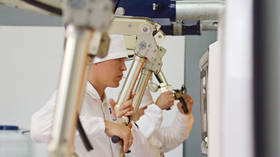Russia’s theoretical crystallographer: nuclear industry & science turn dreams into reality

The Russian nuclear industry turned 75 this year. For all these decades it’s not only been protecting the country, but also boosting its scientific capabilities.
Russia’s well-known chemist and theoretical crystallographer Artem Oganov told RT about the role of the industry in pushing frontiers of science.
“It is certainly possible that in our life-times we’ll reach a point when many genetic diseases can be cured at the embryo stage,” believes Oganov, adding that the worst diseases might soon be eradicated with the help of nano-robots, however fantastical it may sound today.
To stress the point, he emphasized that many of the challenges that scientists grapple with today were thought to be incapable of resolution 20 years ago. The emergence of artificial intelligence and modern computers seemed equally impossible not that long ago, but according to Oganov, we might soon see them self-replicating and self-modifying.
“Maybe one day it will become a closed loop, where a computer invents new materials, and robots select the most optimal in terms of technologies. Then they produce, and this production results in still more effective computers,” added Oganov.












